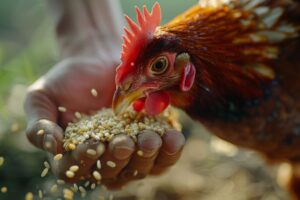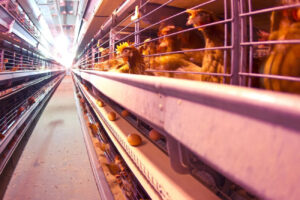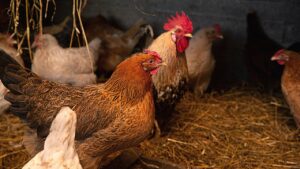Are you a farmer in Nigeria looking for the best place to buy day-old chicks (DOCs)? Starting your poultry business with healthy, high-quality chicks is the most important step for success, as it sets the foundation for your profit. Finding a good hatchery with fair prices can be tough, but this guide will help you. We give you the latest prices, show you how to choose a trusted hatchery, and teach you how to book your chicks safely to avoid scams.
Last updated: Sat, Sep 27, 2025, 8:57 a.m. WAT.
Disclaimer: The poultry market changes fast. We work hard to verify prices by checking online platforms like Afrimash, Livestocking.com, and public farmer forums, but you should always call the hatchery or a distributor to confirm the final price before paying.
Price of day-old broiler in Ibadan today
Day-old broiler chicks in Ibadan are currently ₦72,500–₦77,500 per 50-chick carton (₦1,450–₦1,550 per chick), based on public posts verified the week of September 22, 2025. Prices often change on Monday/Thursday booking windows. Always confirm the final price by phone before payment to ensure you have the most current information.
Ibadan is a major hub for poultry in Nigeria. Prices here can change quickly, sometimes week by week, due to demand, feed costs, and other market factors. For example, prices spiked around September 15th, with some breeds reaching ₦1,800 per chick, but have since stabilized. The prices below reflect the latest publicly available lists from Monday, September 22, 2025.
Price of Day-Old Broiler in Ibadan Today — Last verified: Sat, Sep 27, 2025, 8:15 a.m. WAT Carton = 50 chicks unless stated.
| Hatchery | Breed | Per chick (₦) | Per carton (₦, 50) | Next collection day | Source (public link) |
|---|---|---|---|---|---|
| Zartech | Cobb 500 | 1,450 | 72,500 | Mon/Thu | Poultry Plaza Listing – Sep 25 |
| Agrited | Ross 308 | 1,550 | 77,500 | Mon/Thu | Agrited Dealer Post – Sep 22 |
| CHI Farms | Arbor Acres Plus | 1,500 | 75,000 | Tue/Fri | CHI Distributor Post – Sep 22 |
| Sayed Farms | Ross 308 | 1,500 | 75,000 | Mon/Thu | Sayed Sales Post – Sep 22 |
Note: If two credible sources disagree, we show a range. Always confirm the final price with the sales agent before making payment.
Methodology: We verify prices twice weekly from public posts by official hatchery pages and long-standing dealers, then confirm by phone when possible before publishing. Every figure is time-stamped and linked to a public source.
Disclaimer: Prices may change on the next booking window (usually Mon/Thu mornings). Always pay only to official company accounts and request a stamped invoice.
Understanding the prices is the first step, but knowing the full cost to get them to your farm is what truly matters for your budget. Let’s break down how to calculate your total expenses.
Price of day old chicks in Nigeria today
The price of day-old chicks across Nigeria varies based on your location. The final “landed cost” includes the price per carton plus transport fees, which depend on distance and road conditions. This is why prices are often higher in states far from major southwestern hatcheries. Always budget for transport to know your true starting cost.
While Ibadan is a key market, prices vary across Nigeria. The final cost you pay is the “landed cost.” This isn’t just the price from the hatchery; it includes the cost to safely transport the chicks to your state.
Calculating Your Landed Cost
To calculate your true starting cost, add the transport fee and any local distributor charges to the price of the chicks. This total amount is your “landed cost.” For example, a ₦75,000 carton of chicks plus a ₦3,000 transport fee means your landed cost is ₦78,000. Budgeting this way prevents surprise expenses.
To budget properly, use this simple formula: (Price per Carton) + (Transport Cost per Carton) + (Any Local Distributor Fee) = Your Total Landed Cost. Transporting chicks requires special care in cooled, ventilated vehicles to keep them healthy, which is why it adds to the final price.
Why Prices Vary Across States
Day-old chick prices are higher in some states mainly due to transport costs from southwestern hatcheries. Longer distances, poor road conditions, and local distributor fees all add to the final price. High local demand in poultry-heavy areas can also increase the cost you pay compared to buying directly at the hatchery gate.
You may notice that chicks are more expensive in certain states. This is because of:
- Distance: The farther you are from major hatcheries in the Southwest (like Ibadan), the higher the transport cost.
- Road Conditions: Poor roads can increase transport time and cost, and also stress the birds.
- Local Demand: Prices can be higher in areas with many poultry farms competing for the same supply.
- Distributor Markup: Local distributors add a small fee for their service of bringing the chicks closer to you.
How We Collect Prices: We are committed to giving you accurate information. Our team verifies these prices twice a week (usually on Mondays and Thursdays, which are key pricing days) by checking major online agro-platforms and contacting main distributors. We keep records of these checks to ensure our data is reliable.
Now that you understand the pricing across the country, let’s look closer at the major brands so you can decide which one is right for your farm.
Agrited broiler price today / Agrited broiler price today in Nigeria
A carton of Agrited’s Ross 308 broiler chicks currently costs around ₦77,500 (₦1,550 per chick) as of late September 2025. This breed is a top choice for Nigerian farmers seeking fast growth and excellent feed-to-meat conversion. Prices are confirmed weekly, so always call an official distributor before booking your birds.
Agrited is known for its high-performing Ross 308 broiler chicks. They are a top choice for farmers who want fast growth and efficient feed usage. Agrited has pickup hubs in many states across Nigeria, making them accessible.
- Verified Price Today: A carton of Agrited (Ross 308) broilers is currently around NGN 77,500.
- Last Verified: September 27, 2025, based on public dealer lists from Sep 22. Prices are subject to change.
ZARTECH day old Broiler price today
A carton of Zartech’s Cobb 500 broiler chicks is currently priced around ₦72,500 (₦1,450 per chick) as of late September 2025. Known for being very hardy and resilient, Cobb 500 is a reliable choice for farmers across Nigeria. Prices are updated on booking days, typically Mondays and Thursdays.
Zartech Limited is one of the biggest names in the Nigerian poultry industry. Their Cobb 500 broilers are famous for their strength and ability to perform well even in tough conditions. Their headquarters is in Ibadan, but they have offices and distributors nationwide.
- Verified Price Today: A carton of Zartech (Cobb 500) broilers is currently around NGN 72,500.
- Last Verified: September 27, 2025, based on public dealer lists from Sep 22. Always confirm before booking.
Zartech Day Old layers price
Zartech’s day-old layers, typically the Isa Brown breed, cost around ₦89,000 to ₦90,000 per carton of 50 chicks (₦1,780–₦1,800 per chick) based on recent market quotes. As a leading hatchery, their layers are known for high egg production. Always confirm the final price and availability with a Zartech distributor.
While famous for their broilers, Zartech also produces high-quality layer chicks, with Isa Brown being their primary breed. These birds are sought after for their excellent egg-laying capacity and hardy nature, making them a profitable long-term investment for farmers focused on egg production.
How much is a Zartech day old chick?
A single Zartech day-old broiler chick (Cobb 500) currently costs ₦1,450. This price is calculated by dividing the standard carton price of ₦72,500 by the 50 chicks inside. While the per-chick price is useful for calculation, hatcheries and distributors sell them by the full or half carton, not individually.
This calculation provides a clear unit cost, which is essential for budgeting your expenses, especially when calculating feed costs and potential profit margins per bird. Remember that the price for a day-old layer chick from Zartech is different (around ₦1,800).
How much is a carton of Day Old layers?
A carton of 50 day-old layer chicks in Nigeria currently costs between ₦89,000 and ₦90,000 (₦1,780–₦1,800 per chick), based on September 2025 quotes. Common breeds like Isa Brown are a long-term investment, as they start laying eggs at around 18-22 weeks. Once they start, you can estimate how many crates of eggs they can produce to project your profits.
A standard carton of day-old layers from most major hatcheries in Nigeria contains 50 chicks. Common layer breeds are Isa Brown and Bovans Black, known for high egg production. Pre-booking quotes are currently in the ₦1,780–₦1,800 range.
- Example (as of Sep 22, 2025): If one day-old Isa Brown layer chick is NGN 1,800, a carton will be:
- NGN 1,800 (per chick) × 50 (chicks) = NGN 90,000 per carton.
How much is a box of 100 day old chicks?
The cost for 100 day-old broiler chicks (two cartons) is more than just the chick price. Including transport, starter feed, vaccines, and brooding supplies, your estimated total starting cost is around ₦187,500. This complete budget helps new farmers plan properly and avoid surprise expenses during the critical first few weeks.
A “box of 100” simply means two cartons. But the cost is more than just the price of the chicks. You must budget for everything needed to get them started for the first few weeks.
Your Starter Cost Checklist for 100 Broilers
To budget for 100 broiler chicks, you need to account for the chicks themselves (around ₦150,000) plus essential startup items. This includes transport, at least two bags of starter feed, vaccines, vitamins, a heat source like charcoal, and bedding. This is just for the starter phase; see our guide on how many bags of feed for broilers for the full cycle.
- Cost of 2 Cartons (100 chicks): e.g., NGN 75,000 × 2 = NGN 150,000
- Transport to your farm: e.g., NGN 5,000
- Brooding Starter Feed (2 bags of Super Starter): e.g., NGN 20,000
- Glucose/Vitamins (for arrival water): e.g., NGN 1,500
- Essential Vaccines (Lasota, Gumboro): e.g., NGN 2,500
- Heat Source (Charcoal & Pot): e.g., NGN 2,000
- Wood Shavings (for bedding): e.g., NGN 1,500
- Contingency Fund (for unexpected needs): e.g., NGN 5,000
- Estimated Total Starter Cost: ~NGN 187,500
This detailed budget gives you a realistic picture of your initial investment. Now, let’s look at the bigger picture of broiler costs nationwide.
How much is the cost of a day old broiler in Nigeria?
Nationwide, a quality day-old broiler chick in Nigeria costs between ₦1,450 and ₦1,550. This price range is influenced by factors like feed ingredient costs, the Naira/dollar exchange rate for imports like vaccines, fuel prices for transport, and high demand during festive seasons. This is why prices can change from week to week.
The nationwide price for a quality day-old broiler chick generally ranges from NGN 1,450 to NGN 1,550 based on the latest data. Prices differ because of the hatchery’s reputation, the breed (Ross 308, Cobb 500), and other major economic factors.
Factors That Determine the National Price Range
The price of day-old chicks is set by the hatchery’s operational costs. This includes the price of maize and soya for parent stock feed, the cost of imported vaccines and genetics (affected by the dollar exchange rate), and the price of diesel for generators and transport. When these costs rise, the price of chicks goes up.
- Cost of Feed Ingredients: The price of maize and soya directly impacts the cost of feeding the parent stock birds that lay the eggs.
- Naira/Dollar Exchange Rate: Vaccines, feed additives, and parent stock are often imported, so a weaker Naira increases costs.
- Fuel Prices: Higher diesel and petrol prices increase the cost of running hatchery generators and transporting chicks.
- Seasonality: Demand skyrockets before festive periods like Christmas, Easter, and Sallah, pushing prices up.
Knowing what affects prices helps you plan. The next big decision is choosing which hatchery to trust with your investment.
Which broiler hatchery is the best in Nigeria?
The “best” hatchery depends on your farm’s needs. For fast growth, many choose Agrited (Ross 308). For hardiness, Zartech (Cobb 500) is a top choice. Other reputable options include CHI Farms, Sayed Farms, and Amo Farm for the dual-purpose Noiler. We rank them based on chick quality, support, and reliability.
“Best” depends on your farm’s needs. Some farmers prioritize the fastest growth, while others want the hardiest birds that can withstand stress.
How We Ranked
We ranked the top hatcheries based on factors critical for a farmer’s success. This includes biosecurity protocols to ensure disease-free chicks, high livability (low mortality rates), reliable pickup and distribution networks, good after-sales support for customers, and a comprehensive vaccination program for the parent stock and the chicks.
We considered these factors: biosecurity, DOC livability (low mortality), after-sales support, pickup network, and vaccination program.
Top Hatcheries in Nigeria
Nigeria’s top hatcheries include Agrited (Ross 308), Zartech (Cobb 500), CHI Farms (Arbor Acres), and Amo Farm (Noiler). These brands are trusted by farmers for producing high-quality, healthy chicks with good genetics for either meat or egg production. Choosing from this list is a good first step toward a profitable poultry business.
- Agrited: Known For: Ross 308. Key Advantage: Fast growth and excellent feed conversion. Booking Tip: Contact their official distributors in your state.
- Zartech Limited: Known For: Cobb 500. Key Advantage: Very hardy and resilient chicks with good meat yield. Booking Tip: Book directly via their national offices in Ibadan, Lagos, and other major cities.
- CHI Farms: Known For: Arbor Acres. Key Advantage: A strong brand with both hatchery and processing operations. Booking Tip: Contact their office in Ajanla, Ibadan.
- Amo Farm Sieberer Hatchery (AFSH): Known For: Noiler. Key Advantage: Great for dual-purpose (meat and eggs) and ideal for free-range systems. The Noiler is hardy and can thrive on supplemental feeding.
- Sayed Farms: Known For: Ross 308. Key Advantage: A reliable choice for both DOCs and high-quality poultry feeds. Booking Tip: Call their national sales lines.
- Farm Support Group: Known For: Broiler DOCs. Key Advantage: A key distributor and producer based in Ibadan with a wide reach.
- Obasanjo Farms (Oba Marshall): Known For: Marshall Broilers. Key Advantage: An old, established brand with a long history in Nigeria.
Once you have chosen a hatchery, the next step is to place your order safely and prepare for the arrival of your chicks.
How to Buy Safely (Step-by-Step)
To buy day-old chicks safely in Nigeria, always verify the seller by calling the hatchery’s official number. Pay only into a corporate bank account, never a personal one, and demand a receipt. Understand the specific booking and collection days for your chosen hatchery, and prepare your brooder 24 hours before the chicks arrive.
Follow these steps to protect your money and ensure you get healthy chicks.
1. Verify the Seller
To avoid scams, always verify a seller by calling the official phone number from the hatchery’s website, not just a social media post. Request an invoice and confirm the bank account is in the company’s name (e.g., ‘Zartech Limited’). Be wary of prices that seem too low or sellers who pressure you for quick payment.
Scammers are everywhere. Before paying, call the official phone number listed on the hatchery’s website, not just a number from a Facebook post. Ask for a proforma invoice with a corporate bank account. Red flags include: prices that are too cheap to be true, pressure to pay immediately into a personal account, and sellers who refuse to give a physical office address.
2. Know the Booking and Collection Days
Major hatcheries operate on a strict schedule, with specific days for booking, hatching, and collection (often Mondays and Thursdays). Knowing these days is important for planning. It allows you to book your chicks on time and prepare your brooder so it is warm and ready right before the chicks are scheduled to arrive.
Most major hatcheries hatch and sell chicks on specific days (e.g., Mondays and Thursdays). This is for logistics and to ensure chicks get their first vaccines on time. Know these days so you can prepare your brooder house in advance.
3. Plan for Transport and Brooding
Proper planning for transport and brooding is critical to prevent early deaths. Ensure chicks are transported in a well-ventilated vehicle, not a hot car boot. Your brooder must be disinfected, bedded with wood shavings, and pre-heated to 33-35°C for 24 hours before the chicks arrive. For a full checklist of must-haves when bringing chicks home, see our guide.
This is a critical stage. Poor preparation can lead to high mortality.
Preparing Your Brooder House
Your brooder must be ready 24 hours before the chicks arrive. This includes figuring out how much space they need to avoid overcrowding. For a full list of costs, see our poultry equipment price list.
- Clean & Disinfect: Wash the floor and walls and disinfect completely.
- Add Bedding: Spread dry wood shavings on the floor (about 2-3 inches deep).
- Set Up Heat: Place your heat source (charcoal pot or infrared bulb). The temperature should be around 33-35°C.
- Place Feed & Water: Put feed in shallow trays and provide fresh water with anti-stress (glucose/vitamins).
On Collection Day
When you pick up your chicks, check them. Healthy chicks are active, have dry navels, clear eyes, and are free from deformities. Transport them in well-ventilated boxes, never in the hot boot of a car.
4. Avoid Scams
The number one rule to avoid scams is to never pay into a personal bank account. Part of avoiding scams is having a solid business plan that accounts for verified suppliers. Legitimate hatcheries and distributors use corporate accounts. Always insist on an official, stamped invoice for your payment. If you are unsure about a seller, ask for recommendations in a trusted farmers’ group before sending any money.
Never pay money into a personal bank account. A legitimate company will use an account with its registered name (e.g., “Amo Farm Sieberer Hatchery,” not “David Chukwuma”). Always demand an official receipt. If you are unsure about a distributor, check with other farmers in a trusted online group.
Knowing how to buy safely is crucial, but what do you do once the chicks arrive? The first few days are the most critical.
First 72 Hours: A Checklist for Success
To ensure your day-old chicks survive the first 72 hours, provide immediate access to clean water with anti-stress vitamins. Introduce starter feed about two hours later. Maintain a brooder temperature of 33-35°C and ensure 24/7 light and feed. These steps are critical for reducing early mortality and giving your flock a strong start.
The actions you take immediately after your chicks arrive will determine their survival and future growth.
- Immediate Hydration: As soon as they arrive, gently dip the beaks of a few chicks in the vitamin-laced water to teach them where it is.
- Introduce Feed: About 2-3 hours after they have had water, introduce their feed on flat trays or clean paper so they can find it easily.
- Monitor Temperature: Check the brooder temperature regularly. If chicks are huddling together, they are cold. If they are far from the heat source and panting, they are too hot.
- Check for Pasty Butt: Look for droppings stuck to their vents. Also watch for signs of common issues like diarrhea or respiratory infections.
- Ensure 24/7 Light and Feed: For the first week, chicks need light and access to feed and water all day and night to get a strong start.
Following these steps will drastically reduce early mortality. As you become more experienced, it’s also important to understand our commitment to providing accurate data.
Methodology and Sources
We provide reliable, people-first content by verifying prices twice a week. Our team checks public posts from official hatchery pages and trusted distributors, and we keep records of our checks. Every price is time-stamped and, where possible, linked to a public source to ensure transparency and accuracy for Nigerian farmers.
We are dedicated to providing helpful, reliable, and people-first content. We verify prices twice a week by checking major online agro-platforms and contacting reputable distributors. We keep call notes and reference official invoices to ensure our information is accurate. Every price we list is marked with a “Last Verified” date and time.
To wrap up, here are answers to some more common questions farmers ask.
FAQs (Frequently Asked Questions)
1. Where can I buy high-quality day-old chicks in Nigeria?
You can buy from top hatcheries like Agrited, Zartech, CHI Farms, Amo Farm (Noiler), and Sayed Farms. See our full list above for details.
2. What is the price of a day-old broiler in Ibadan today?
Prices range from NGN 72,500 to NGN 77,500 per carton of 50, based on the latest available data. Check our updated price table for today’s estimate.
3. How much is a carton of Day-Old Layers?
A carton of 50 layers typically costs between NGN 89,000 and NGN 90,000, depending on the hatchery and breed, based on recent quotes.
4. What is brooding and why is it so important?
Brooding is the care given to chicks during the first few weeks of life, which involves providing heat, feed, water, and protection. It is critical because chicks cannot regulate their own body temperature and are very fragile. Good brooding ensures a low mortality rate and a strong start.
5. Can I mix broiler and layer chicks in the same pen?
It is not recommended. Broilers and layers have very different growth rates, feed requirements, and lighting needs. Mixing them will lead to poor performance for both types of birds.
6. What is the difference between Broiler, Layer, and Noiler chicks?
It’s important to understand the difference:
Broilers (e.g., Cobb 500, Ross 308): Bred for rapid meat production, ready in 6-8 weeks.
Layers (e.g., Isa Brown): Bred for high egg production, start laying around 18-22 weeks.
Noilers (from Amo Farm): A dual-purpose breed developed in Nigeria. They are hardier than broilers, can be raised free-range, and are good for both meat and eggs. They grow slower than broilers but faster than local birds.
7. How can I reduce mortality (deaths) in the first week?
Prepare your brooder 24 hours in advance, ensure the correct temperature, provide clean water with anti-stress vitamins upon arrival, use high-quality starter feed, and prevent drafts in the brooder house.
8. What is the best season to start raising broilers in Nigeria?
This is a critical strategic question. The dry season is often preferred as it reduces the risk of diseases associated with dampness, but both seasons have pros and cons. We cover this in our detailed guide on the best season to raise broilers in Nigeria.
9. How should I manage my poultry during Harmattan?
Harmattan brings unique challenges like dust and cold nights. Proper management involves adjusting brooder heat, protecting birds from drafts, and ensuring clean water to prevent respiratory issues. You can find specific tips in our guide on how to manage poultry in Harmattan.
Conclusion: Your Journey to Poultry Success
Starting a poultry farm in Nigeria is a rewarding journey, but success begins with the very first step: choosing high-quality day-old chicks. By understanding the market prices, selecting a reputable hatchery like Agrited or Zartech, and budgeting for the true landed cost, you are already ahead of the game. Remember that good management, especially during the critical first few days of brooding, is just as important as the quality of the chicks you buy.
Use this guide as your trusted companion. Verify sellers, prepare your brooder properly, and follow best practices. With careful planning and hard work, you can build a profitable and sustainable poultry business. Happy farming!

Oladepo Babatunde is the founder of ChickenStarter.com. He is a backyard chicken keeper and educator who specializes in helping beginners raise healthy flocks, particularly in warm climates. His expertise comes from years of hands-on experience building coops, treating common chicken ailments, and solving flock management issues. His own happy hens are a testament to his methods, laying 25-30 eggs weekly.



